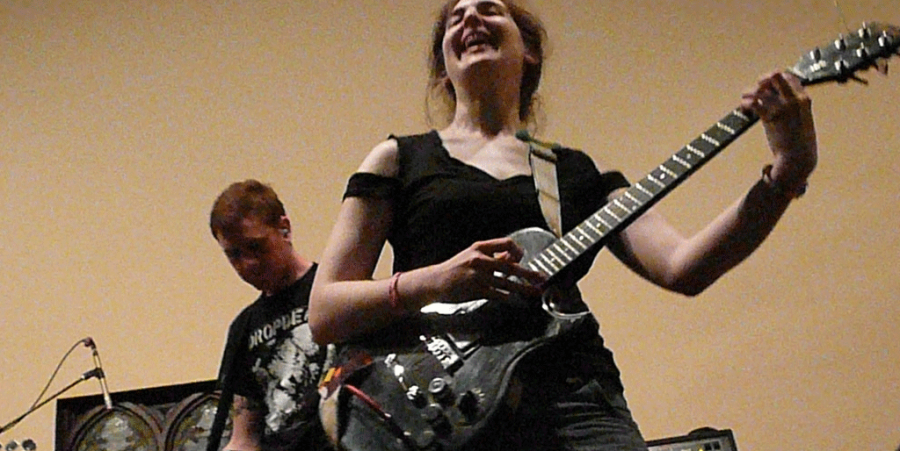7:08 p.m.: This post has been revised to reflect new information from ASCAP.
ASCAP, one of a few organizations that collects royalties on behalf of musicians and songwriters, is going after D.C. punk-rock church St. Stephen’s.
This morning, an ASCAP licensing manager emailed a licensing agreement and an invoice for $472 to Mark Andersen, who helps organize concerts in the church on behalf of Positive Force, the punk collective he co-founded. The invoice says St. Stephen’s owes two years of licensing fees, dating back to February 2013—when Ian MacKaye’s band The Evens played a benefit show at the venue.
Andersen says St. Stephen’s shouldn’t have to pay. So far, ASCAP has not presented any evidence to the church that ASCAP music was played there. (The email’s sender declined to comment.)
A general licensing manager from the organization contacted the church soon after MacKaye and Amy Farina’s band played the Positive Force event there more than a year ago. The manager said the show needed to be “properly licensed.” The church declined to pay, Andersen says, because The Evens don’t have any connection to ASCAP.
“The Evens’ songs are not registered with any performance-rights organizations,” MacKaye writes in an email. “The band plays no covers, and owns 100 percent of the publishing of the songs we’ve written. ASCAP has zero control, interests, or rights to our music. I don’t know why they want to get into this mess.”
If St. Stephen’s has played any music by artists under ASCAP’s umbrella, it would be subject to fees. Churches who play ASCAP music (or host performers who cover it) are only exempt from the payments if the music in question is played during religious services, says Vincent Candilora, ASCAP’s executive vice president of licensing.
Andersen says it’s possible some recorded ASCAP music was played before or after The Evens show, but he’s not sure. “If they have evidence that we’re infringing,” Andersen says, “we’d be glad for them to present it.”
Here’s the email ASCAP sent Mark Andersen today:
ASCAP’s Telephone Licensing Manager has contacted you concerning your need to obtain permission to lawfully perform the copyrighted music of our members in your establishment. As we have not received your signed license agreement and fees, your file has been referred to me. According to our records, we have provided information on ASCAP, our members and repertory, the copyright law and our licensing activities. By now you undoubtedly have a better understanding of the need to obtain permission to use copyrighted music in our repertory.
An ASCAP license will provide you with the permission to lawfully perform our members’ music at your business by giving you access to all of the millions of works found in the ASCAP repertory. In order for your business to be licensed, it will be necessary for you to sign and return the attached agreement along with payment as invoiced. A countersigned copy of the license will be returned for your files.
We hope you will take this opportunity to resolve this matter. Should you have any questions regarding ASCAP licensing, the attached agreement or the factors used in determining your license fee, please do not hesitate to contact me toll-free at the number listed below. We at ASCAP look forward to serving your licensing needs.
Candilora says he’s contacted the licensing manager who sent the email and hasn’t heard back yet. But he also points out that ASCAP doesn’t have to be certain that a venue owes it money in order to send a letter like the one St. Stephen’s received.
ASCAP just sends notices (Candilora calls them “offers”) to businesses that could have played its music at some point, Candilora says. If the business has not played any infringing music, ASCAP assumes they’ll let them know and put the issue to bed. “We would expect for somebody to say, ‘This is the composer, these are the songs, and they are not with ASCAP,’ and that would be fine,” he says.
Andersen says he’s already informed ASCAP that he doesn’t believe St. Stephen’s requires a license. “Evidently that never got to us,” Candilora says.
Usually businesses are subject to the fees, Candilora says. “We have 8.5 million songs in our repertory. ASCAP has been a business for 100 years, so it’s everything from Irving Berlin on up. Most of the time, there are works in the repertory that are being performed.”
Photo by Flickr user angela n. used under a Creative Commons license.


